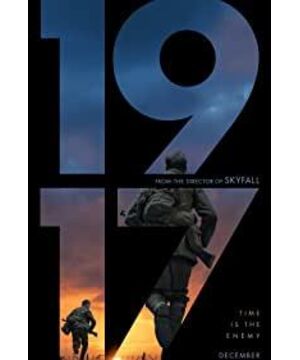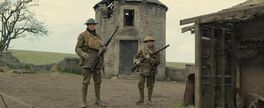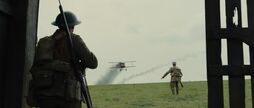Although it looks like an rpg game, it is indeed an anti-war film. On the way to deliver the letter, there are human and livestock corpses, or broken walls everywhere. In contrast, how they traverse this layer of blockade has become secondary. After all, this is a miracle, and any statement will be unbelievable.
People always have preferences and positions. The friendly non-commissioned officers of the British army would remind him to be careful of the war mad and remember to look for witnesses. However, there are adjutants around the war mad; perhaps the most negative is the domineering officer. But what is so strange about this? The German soldiers, however, include pilots who assassinated rescuers, hell messengers who emerged from the flames, young people who promised to shut up but turned back and so on... The position of the film is self-evident. But overall, the film's position is still higher.
What impressed me was the long period after entering the town and before the end.
He walked through the light bullets and escaped with gunfire. Dodge in the ruins to the bright end (light?), but this light is the burning fire of the church (hell!). A figure appeared in the light, and he seemed to be walking towards the figure involuntarily. However, the figure recognized him and started chasing him. So he began to flee again.
Fortunately, he hid underground; there were people living here. Is a French woman. (My friend reminded me that the battle of the film took place in France, when Britain and France were in an alliance.) After confirming that the other party was not hostile, he relaxed. He discovered that there were babies here, but the women didn't know the name of the child or the parents of the child. Perhaps the women and children who appeared here reminded him of his family, so he was comforted for a while. He, who had just gone through life and death, perhaps because he knew how bad he was, he quickly sent out his food to repay this short-term comfort.
However, solace is always solace, and facing death is his task. He gained the courage to move forward because of this comfort, walked through the rain of bullets again, and then leaped into the river. He was infinitely close to death in the rapids, but he woke up before being completely submerged. He was rushed to the side of many corpses. Is it a civilian? British soldiers? Or German soldiers? In this place of death, what is the difference between who was in his lifetime? But he was still alive, and he escaped from the corpse in embarrassment, weeping with joy on the bank of the river of death.
Then, he heard the call of singing, and finally saw the friendly army. At this moment, he probably only has the desire for life, and even the task is set aside. He got a new life at this moment. And then, he wants to give the hope of life to more people.
I think this "death and rebirth" plot is the proof of this film's anti-war.
View more about 1917 reviews











